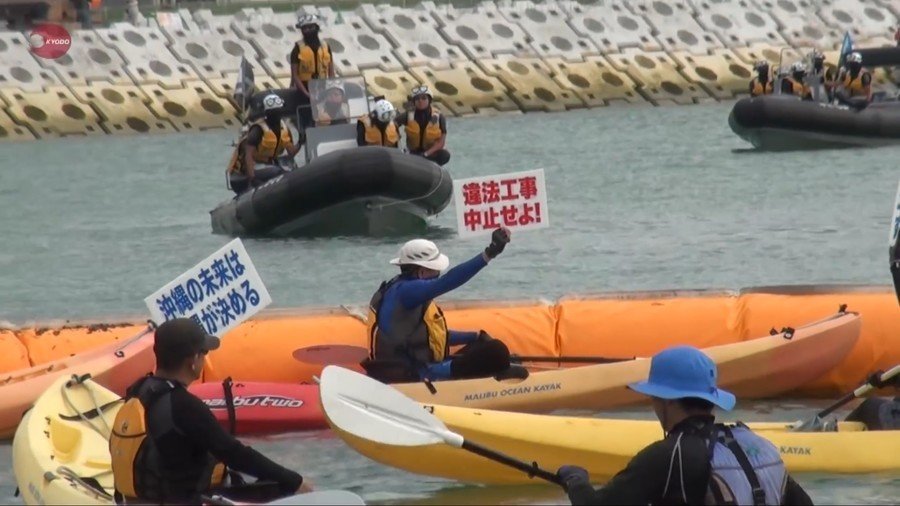Okinawans in canoes face off against coast patrol in protest over US military presence (VIDEO)

Residents of the Japanese island of Okinawa vented their frustration over the planned relocation of an American military base within Okinawa Prefecture, following a recent US F-15 fighter jet crash in the sea near the island.
A long simmering dispute between the United States and Japan over the fate of a Marine Corps base on Okinawa intensified after a US F-15C Eagle fighter jet crashed into the sea in the vicinity of the island.
READ MORE: US fighter jet crashes into sea in Japan
Residents of Henoko Bay gathered in 70 canoes and a number of small vessels to protest the relocation of the US military base on the island, as they faced off against Japan Coast Guard patrol ships, on the spot where US Marine Corps Air Station Futenma is scheduled to be placed.
Alarmed that the scheduled relocation of the base would seriously jeopardize the safety of the island, residents of Henoko Bay expressed their resentment with placards saying, "Don't construct a base," and "Don't dump gravel." More than half of the protesters in canoes were arrested after entering the would-be replacement site.
The relocation of the US' Futenma military base from the over-populated city of Ginowan, a city on Okinawa's main island, to the northern and less populated area of Henoko Bay, has been in the state government's agenda for decades. However, residents of the poorest of Japan's prefectures have shown resilience in opposing the environmental degradation caused by the US military presence.
Residents have been particularly alarmed following a string of incidents and emergencies that have plagued the island. Okinawans have raised concerns about machinery mishaps, noise, sexual assaults against Japanese women, and even some deadly incidents – all of which triggered massive protests. Plans to deploy the military base to Henoko Bay already saw tens of thousands of Okinawans take to the streets back in 2016, after a Japanese woman was raped and murdered by a US Marine veteran.
Locals fighting against what they perceive as injustice have formed several protest groups, standing up to the government efforts to squelch dissent. According to one of the protest leaders, Hiroji Yamashiro, US ambitions to have a base in Henoko Bay in an attempt to contain a rising China in the South China Sea might antagonize China and "fan the arms race."
Despite fierce local opposition to the US military presence in the prefecture, in April of last year, the state government decided to go ahead with plans to build seawalls, preparing the groundwork for the land reclamation.
While many Okinawans openly resent the bulk of the US military facilities on the island, a recent US military jet crash became a lightning rod for deeper grievances about their military presence.
Protesters have clashed with security forces a number of times around the US Marine Corps' Camp Schwab, located next to the relocation site.
Okinawa's Governor, Takeshi Onaga, who over the years has repeatedly denounced the island's militarization and sought to reduce the US presence, vowed to retract the approval given to the state's landfill plan by his predecessor. The governor's tough stance is sure to aggravate the increasingly rocky relationship between the state and local government over the project.
In 2015, Onaga revoked permission for landfill construction. His decision was overruled by the central government, which went ahead with the project.
Despite Henoko's fierce standoff, the state government, led by Prime Minister Shinzo Abe, remains committed to the relocation of the base to Henoko Bay, in order to strengthen ties with its strategic partner, the US.
Think your friends would be interested? Share this story!















